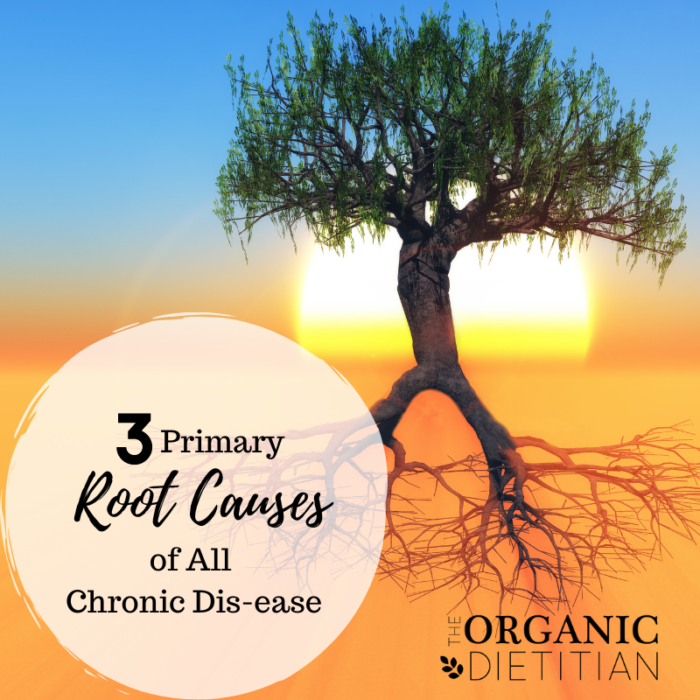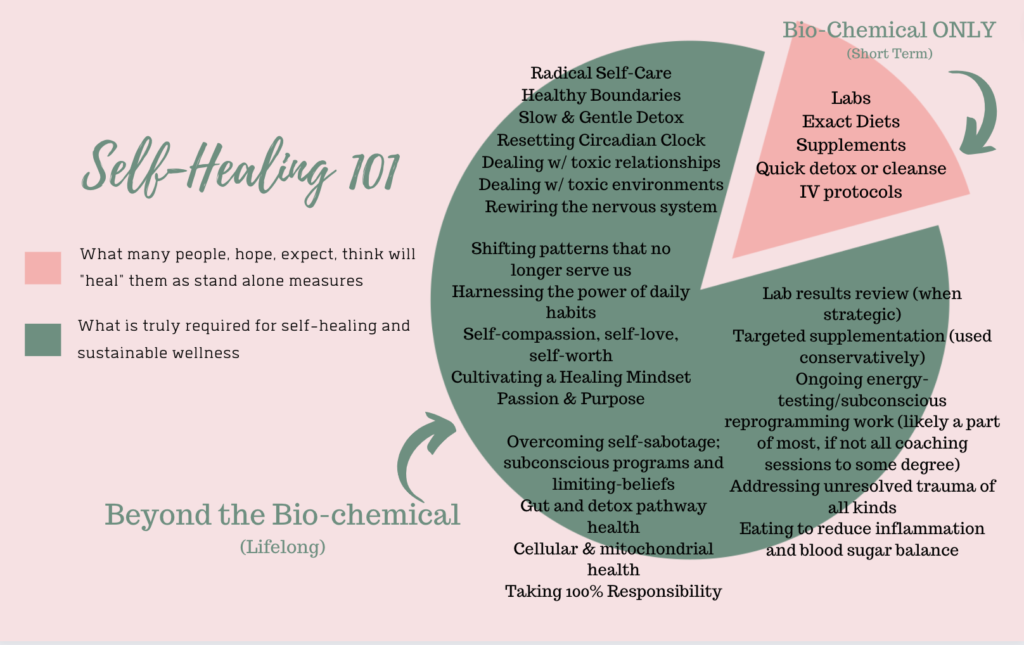28 June, 2024
The 3 Primary Root Causes of ALL Chronic Dis-ease

Are you tired of being told that your chronic illness is due to adrenal fatigue, hormone imbalances, or gut infections? Only to be handed a list of supplements to take that are supposed to fix these issues, yet still end up struggling with your health? While these factors certainly play a role in our health, they are often merely symptoms of much deeper issues. If you’re a health enthusiast, chronic illness warrior, wellness practitioner, health coach, or self-healer, you’ve likely asked yourself: “Why am I unwell, and what can I do to overcome these health challenges truly?”
In this post, we’ll explore the three primary root causes of all chronic dis-ease. Understanding these root causes is crucial for anyone seeking health and well-being.
The Myths About Chronic Illness
First, let’s dispel some common myths. People don’t become chronically ill because of a deficiency in prescription drugs or supplements. The true root causes of chronic illness are not adrenal fatigue, thyroid issues, hormone imbalances, gut infections, toxic burdens, or food sensitivities. These are often manifestations of deeper, underlying issues.
The 3 Primary Root Causes of All Chronic Dis-ease
1. Unresolved Traumatic Stress (BIGGIE!)
Unresolved traumatic stress is a significant contributor to chronic dis-ease. Whether you’re aware of it or not, past trauma can leave lasting imprints on your psyche and body, leading to a range of physical and emotional symptoms. Trauma influences how your body reacts to stress, impacting everything from your immune system to your digestive health.
Related Blog Post: Unresolved Trauma: The Hidden Root Cause of Chronic Disease You Need to Know About!
Key Points:
- Trauma affects the autonomic nervous system, leading to chronic stress responses.
- It can disrupt your body’s natural healing processes.
- Addressing unresolved trauma can lead to profound improvements in health.
2. An Impaired Energy Production System
Your body’s ability to produce energy efficiently is critical to overall health. An impaired energy production system can lead to fatigue, poor cellular function, and a cascade of other health issues.
Key Points:
- Mitochondria, the powerhouse of cells, must function optimally for good health.
- Nutrient deficiencies or eating a diet that is not compatible with your body, toxins, chronic stress, and unresolved trauma can impair energy production.
- Supporting mitochondrial health can improve energy levels and overall wellness (and no, I am not just talking about supplemental support).
- Related Blog Post: Cell Danger Response: Is it Keeping You Sick and Tired?
3. Autonomic Nervous System Dysfunction
The autonomic nervous system (ANS) controls involuntary functions such as heart rate, digestion, and respiratory rate. Dysfunction in the ANS can lead to a host of chronic health issues, as it disrupts the balance between the sympathetic (fight or flight) and parasympathetic (rest and digest) states.
Key Points:
- Chronic stress of all kinds can throw the ANS out of balance.
- Techniques like mindfulness, meditation, and deep breathing are a few tools that can support ANS function (but these are just a small part of the puzzle).
- Proper ANS function is essential for physical, mental, and emotional well-being.
- Related Blog Post: Your Autonomic Nervous System: A Missing Piece to Your Health Journey
The Role of Hair Tissue Mineral Analysis (HTMA)
Properly interpreting a Hair Tissue Mineral Analysis (HTMA) can provide insights into all three of these areas. Unresolved trauma and personality predispositions heavily influence mineral levels, distribution, synergistic ratios, and toxic elements.

Benefits of HTMA
- Provides a snapshot of your body’s mineral status and toxic element exposure.
- Offers clues about your stress levels and how your body handles stress.
- Can guide personalized lifestyle and dietary recommendations.
Healing Beyond Biochemistry
Relying solely on a biochemical approach to health is outdated and often ineffective in the long term. It’s not enough to play whack-a-mole with specific symptoms and conditions. A truly holistic, whole-person approach is needed.

Key Principles:
- Interpretation: A well-trained practitioner can skillfully interpret HTMA results and help identify root causes that might be missed or ignored.
- Client Understanding: Helping clients see and understand the true reasons for their challenges sets the stage for genuine healing.
- Actionable Steps: Co-create highly actionable lifestyle and habit-based steps to help clients become their best self-healers.
Empowering Practitioners and Clients
Learning to interpret and implement HTMA in this way empowers practitioners and clients alike. It fosters out-of-the-box critical and strategic thinking skills, promotes holistic and trauma-informed care, and enhances transformational coaching skills.
For Practitioners:
- Develop a comprehensive understanding of client health beyond biochemistry.
- Stand out in the industry by offering truly holistic, trauma-informed care.
- Achieve transformational client outcomes and earn a sustainable living.
For Clients:
- Gain insights into the true root causes of your health issues.
- Learn practical steps to improve your health and well-being.
- Transform into your own best badass self-healer.
Conclusion
Understanding the three primary root causes of chronic dis-ease—unresolved traumatic stress, an impaired energy production system, and autonomic nervous system dysfunction—can revolutionize your approach to health and healing. Whether you’re a wellness practitioner, health enthusiast, or someone battling chronic illness, addressing these root causes can lead to profound and lasting improvements in your health.
Ready to take the first step towards true healing? Explore the power of HTMA and holistic health strategies today!















 80% of chronic dis-ease is rooted in stre
80% of chronic dis-ease is rooted in stre
 As
As 
